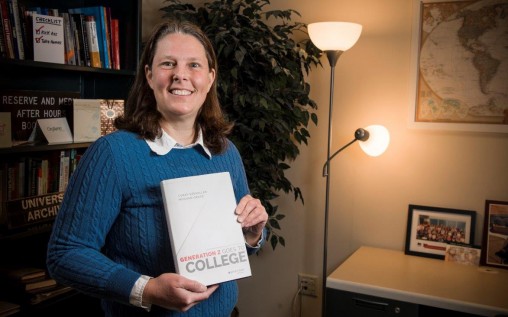
Research by Corey Seemiller, assistant professor of organizational leadership, finds members of Generation Z are smart, giving and independent. (Photo by Erin Pence)
Generation Z — they’re smart, they’re giving, they’re independent and they’re here.
These are among the findings in “Generation Z Goes to College,” an insightful book written by Corey Seemiller, assistant professor of organizational leadership at Wright State University, and co-author Meghan Grace.
Just as the Baby Boomers, Generation X and the Millennials shaped society and higher education, so is Generation Z expected to.
“They are smarter and savvier than any recent generation,” said Seemiller. “Between that and their access to information, they’re going to do big things. They want to change the world.”
Generation Z, those born from 1995 to 2010, currently constitute a large segment of U.S. college students. The oldest members are now college juniors.
Many people think of Generation Z only as being tech-savvy — constantly texting and using social media.
“As important and as interesting as that is, they are far more complex than just that one behavior,” said Seemiller.
Members of Generation Z describe themselves as loyal, responsible and compassionate. The oldest of them were in kindergarten during the 9/11 terrorist attacks.
“They don’t necessarily remember the event, but they do know a life in which we’ve always been pretty much at war and terrorism and ramped-up school shootings,” said Seemiller. “They just know that the world is a scary place. They also grew up in a time of recession. Some of them recalled their parents losing their jobs, losing their homes.”
 As a result, many members of Generation Z are more realistic about their futures than say the Millennials, whose rosy outlook was nourished by a relatively strong economy, budget surpluses and relatively little overseas military conflict.
As a result, many members of Generation Z are more realistic about their futures than say the Millennials, whose rosy outlook was nourished by a relatively strong economy, budget surpluses and relatively little overseas military conflict.
“For me, the most profound finding was that these Generation Z students know in one sense that realistically they are not guaranteed a job after college graduation,” Seemiller said. “And many believe that getting a job with an established company or organization isn’t really what they want to do anyway.”
Many members of Generation Z see themselves as entrepreneurs and want to create their own businesses. And Seemiller says higher education needs to think about how to meet the needs of these students.
“They are asking for things like access to entrepreneurship classes for every major instead of just the business major,” she said. “What if you’re a dance major and you want to run your own dance studio?”
More than 40 percent want to invent something that revolutionizes society.
“They’re coming to college because they want to get tooled to be able to go out and change the world,” said Seemiller. “It’s a different mentality. They want more opportunity to invent and create. I hope we make space in college for them to use this as a laboratory to make those changes and just think differently about the way that we educate and develop students.”
Members of Generation Z are multitaskers and at any given time have an average of five screens open at the same time on their laptops, tablets, phones or watches. Seemiller is concerned that some of these students may be learning in a superficial way.
“Some don’t like to read books cover to cover because they like to digest information in snippets,” she said. “Some of the liberal arts learning practices we’ve had around for hundreds of years are really being flipped on their heads.”
The beginnings of what led to the book occurred in the summer of 2013, when Seemiller first became aware of Generation Z when she was director of Leadership Programs at the University of Arizona. At the time, only market researchers seemed to know of Generation Z.
In the summer of 2014, Seemiller and co-author Meghan Grace launched a study that involved 15 colleges and universities surveying a total of more than 1,200 Generation Z students in their first six weeks of college.
“We asked them all sorts of things about their motivations and concerns,” she said. “How do they learn? What do they care about? How do they define themselves? How do they relate to people? What do they think of their parents? And we were able to get little snippets of stories from these students.”
In addition, Seemiller and Grace were able to see the results of a Northeastern University telephone poll of more than 1,000 Generation Z students. Then they reviewed other similar studies, more recent market research, census information and finally results from a Higher Education Research Institute survey of thousands of college campuses and more than 150,000 Generation Z students.
By the time they were done, Seemiller and Grace had more than 300 sources. All of the results closely matched their own findings.
“But ours was the only study that had stories to go along with it,” she said. “So we decided to put it together as a book.”
Seemiller got her bachelor’s degree in communication from Arizona State University, her master’s in educational leadership from Northern Arizona University and her doctorate in higher education administration from the University of Arizona.
She got involved in leadership studies while working at Sonoma State University in California. She was asked to teach a course in leadership and later developed a leadership program for first-generation students.
“I just fell in love with leadership. I like it because it allows you to help students to reach their potential in ways that other people might have not tapped into before,” she said. “It was empowering to know that I was helping these students be the best they could be.”
Seemiller joined the faculty at Wright State in 2015. She was attracted to the university and the College of Education and Human Services because it offers strong leadership courses and has a large, established undergraduate program.
“In the world of undergraduate leadership studies, Wright State is doing it right. And people around the country know that,” she said. “It’s a very well-regarded, well-esteemed program nationally.”
Seemiller believes organizational leadership gives graduates an essential versatility in working with people.
“It is an opportunity to blend your social sciences, which is understanding the psychology and sociology of working with others. And you’ve got the skill sets of majors like communication wrapped into this,” she said.
Seemiller said employers are looking for workers with leadership-related qualities.
“They want people who can work in teams, think critically, take initiative,” she said. “The organizational leadership major is that.”

 Walking through open doors
Walking through open doors  Adventures await
Adventures await  Wright State to expand nursing facilities to meet workforce needs and prepare more graduates for in-demand careers
Wright State to expand nursing facilities to meet workforce needs and prepare more graduates for in-demand careers  Wright State student-athletes make a lasting impact on local family with more to come
Wright State student-athletes make a lasting impact on local family with more to come  Wright State names Rajneesh Suri dean of Raj Soin College of Business
Wright State names Rajneesh Suri dean of Raj Soin College of Business 